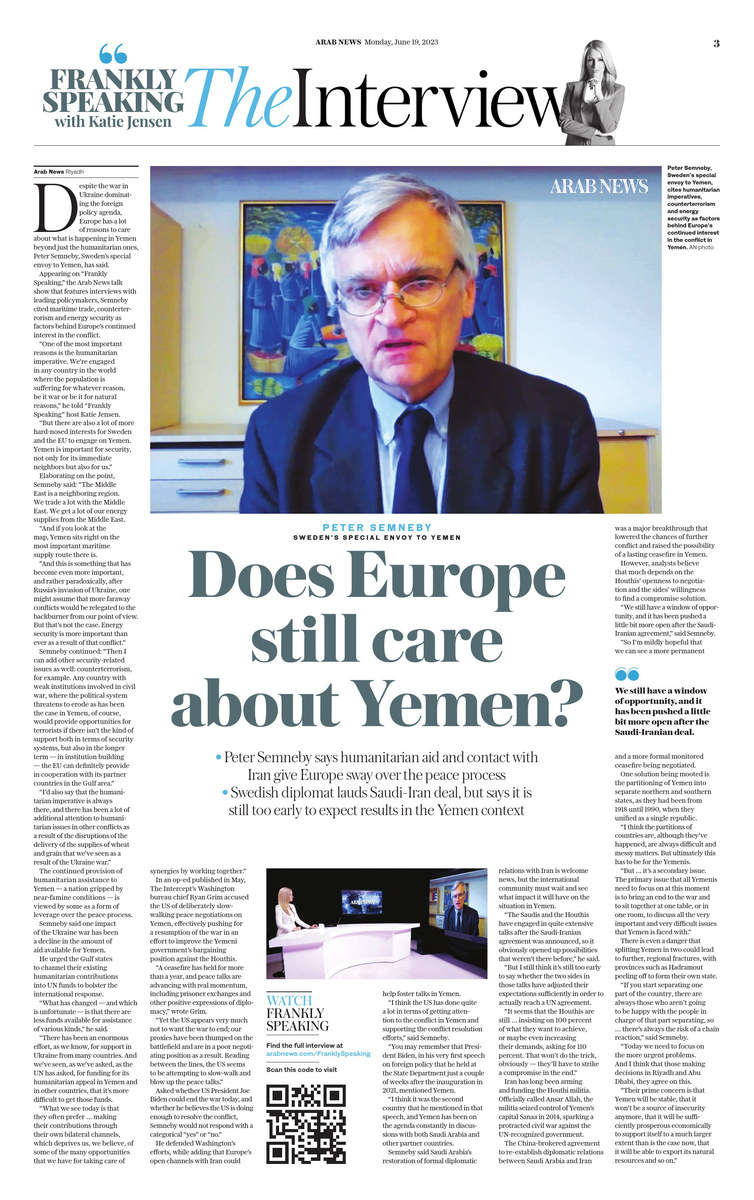RIYADH: Despite the war in Ukraine dominating the foreign-policy agenda, Europe has a lot of reasons to care about what is happening in Yemen beyond just the humanitarian ones, Peter Semneby, Sweden’s special envoy to Yemen, has said.
Appearing on “Frankly Speaking,” the Arab News talk show that features interviews with leading policymakers, Semneby cited maritime trade, counterterrorism and energy security as factors behind Europe’s continued interest in the conflict.
“One of the most important reasons is the humanitarian imperative. We’re engaged in any country in the world where the population is suffering for whatever reason, be it war or be it for natural reasons,” he told “Frankly Speaking” host Katie Jensen.
“But there are also a lot of more hard-nosed interests for Sweden and the EU to engage on Yemen. Yemen is important for security, not only for its immediate neighbors but also for us.”
Elaborating on the point, Semneby said: “The Middle East is a neighboring region. We trade a lot with the Middle East. We get a lot of our energy supplies from the Middle East.
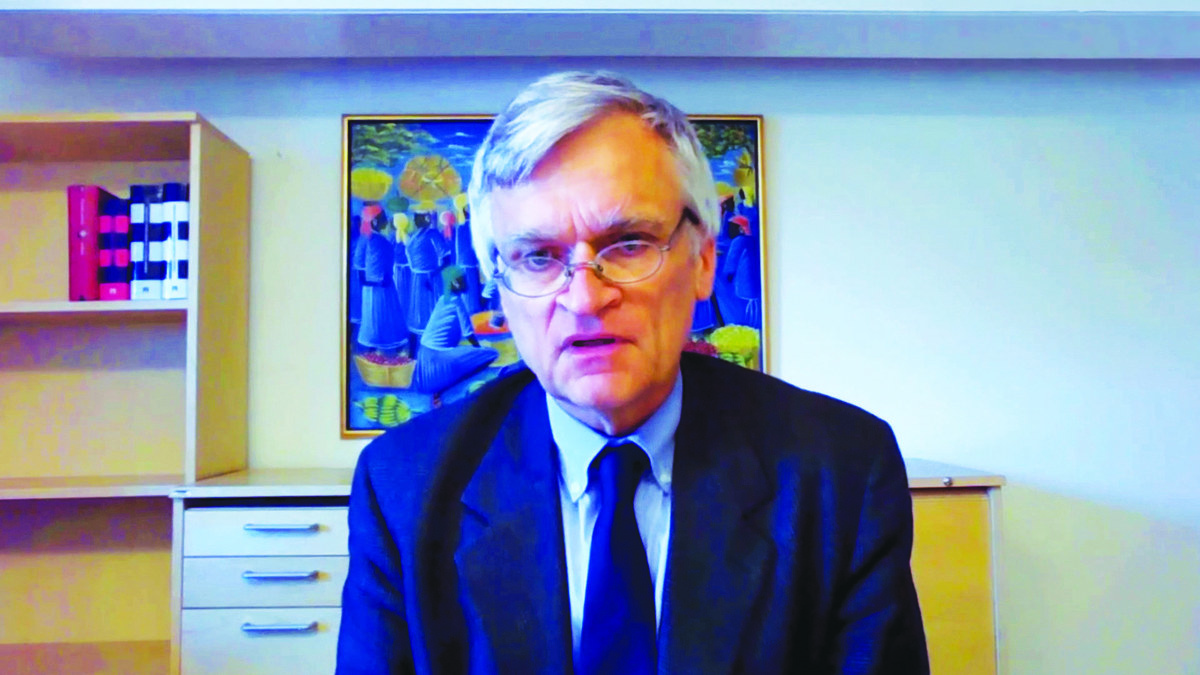
Peter Semneby, Sweden’s special envoy to Yemen. (Supplied)
“And if you look at the map, Yemen sits right on the most important maritime supply route there is.
“And this is something that has become even more important, and rather paradoxically, after Russia’s invasion of Ukraine, one might assume that more faraway conflicts would be relegated to the backburner from our point of view. But that’s not the case. Energy security is more important than ever as a result of that conflict.”
Semneby continued: “Then I can add other security-related issues as well: counterterrorism, for example. Any country with weak institutions involved in civil war, where the political system threatens to erode as has been the case in Yemen, of course, would provide opportunities for terrorists if there isn’t the kind of support both in terms of security systems, but also in the longer term — in institution building — the EU can definitely provide in cooperation with its partner countries in the Gulf area.”
According to Semneby, the war in Ukraine and resulting sanctions on Russia, which resulted in soaring energy prices on the continent, actually made Europe’s energy interests in the Middle East an even more important consideration.
“The war in Ukraine has definitely made us think a lot harder about how we secure our trade routes, how we secure, in particular, energy supplies. And Yemen has a strategic location with immense importance for energy supplies,” he said.
“I’d also say that the humanitarian imperative is always there, and there has been a lot of additional attention to humanitarian issues in other conflicts as a result of the disruptions of the delivery of the supplies of wheat and grain that we’ve seen as a result of the Ukraine war.”
The continued provision of humanitarian assistance to Yemen — a nation gripped by near-famine conditions — is viewed by some as a form of leverage over the peace process.
Semneby said one impact of the Ukraine war has been a decline in the amount of aid available for Yemen.
He urged the Gulf states to channel their existing humanitarian contributions into UN funds to bolster the international response.
“What has changed — and which is unfortunate — is that there are less funds available for assistance of various kinds,” he said.
“There has been an enormous effort, as we know, for support in Ukraine from many countries. And we’ve seen, as we’ve asked, as the UN has asked, for funding for its humanitarian appeal in Yemen and in other countries, that it’s more difficult to get those funds.
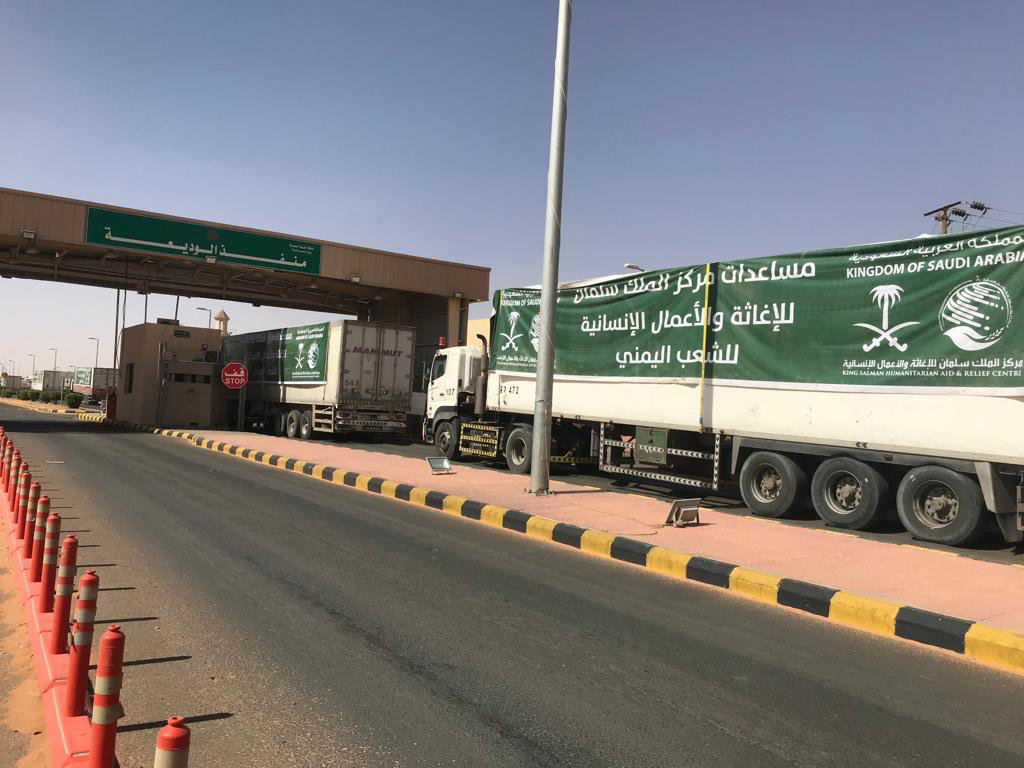
In this photo taken on January 7, 2023, trucks cross Alwadiah port in the Saudi-Yemen border carrying dialysis supplies provided by #KSrelief to be distributed in several Yemeni governorates. (Twitter: @KSRelief-EN)
“This has to be done through a joint effort, and it’s of course not only Sweden, Europe, countries in the north that should provide funding to the UN efforts. We’re having a constant discussion with our partners in the Gulf area.
“And I’d expect that this would become an even more important topic for our joint strategizing about Yemen and all the conflicts that the Gulf countries should also contribute a larger share to the joint UN effort.
“What we see today is that they often prefer … making their contributions through their own bilateral channels, which deprives us, we believe, of some of the many opportunities that we have for taking care of synergies by working together.”
In an op-ed published in May, The Intercept’s Washington bureau chief Ryan Grim accused the US of deliberately slow-walking peace negotiations on Yemen, effectively pushing for a resumption of the war in an effort to improve the Yemeni government’s bargaining position against the Houthis.
“A ceasefire has held for more than a year, and peace talks are advancing with real momentum, including prisoner exchanges and other positive expressions of diplomacy,” wrote Grim.
“Yet the US appears very much not to want the war to end; our proxies have been thumped on the battlefield and are in a poor negotiating position as a result. Reading between the lines, the US seems to be attempting to slow-walk and blow up the peace talks.”
Asked whether US President Joe Biden could end the war today, and whether he believes the US is doing enough to resolve the conflict, Semneby would not respond with a categorical “yes” or “no.”
He defended Washington’s efforts, while adding that Europe’s open channels with Iran could help foster talks in Yemen.
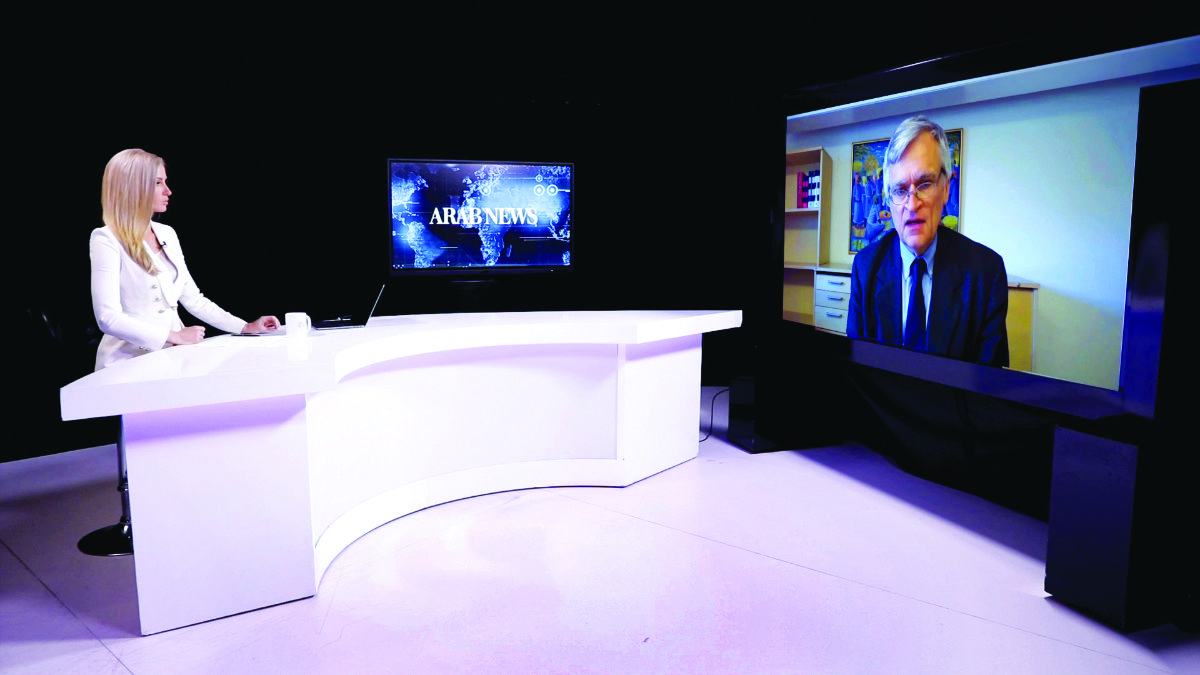
Frankly Speaking host Katie Jensen interviewing Peter Semneby, Sweden’s special envoy to Yemen. (Supplied)
“I think the US has done quite a lot in terms of getting attention to the conflict in Yemen and supporting the conflict resolution efforts,” said Semneby.
“You may remember that President Biden, in his very first speech on foreign policy that he held at the State Department just a couple of weeks after the inauguration in 2021, mentioned Yemen.
“I think it was the second country that he mentioned in that speech, and Yemen has been on the agenda constantly in discussions with both Saudi Arabia and other partner countries.
“Of course, it’s important that the Americans do this in cooperation with others. We’re working very closely with the Americans as well.
“The Americans don’t have direct communication channels with the Iranians. Others have. So I think it’s not correct to assume that the Americans by themselves would be able to do this if they did so.”
Semneby said Saudi Arabia’s restoration of formal diplomatic relations with Iran is welcome news, but the international community must wait and see what impact it will have on the situation in Yemen.
“The Saudis and the Houthis have engaged in quite extensive talks after the Saudi-Iranian agreement was announced, so it obviously opened up possibilities that weren’t there before,” he said.
“But I still think it’s still too early to say whether the two sides in those talks have adjusted their expectations sufficiently in order to actually reach a UN agreement.
“It seems that the Houthis are still … insisting on 100 percent of what they want to achieve, or maybe even increasing their demands, asking for 110 percent. That won’t do the trick, obviously — they’ll have to strike a compromise in the end.”
Iran has long been arming and funding the Houthi militia. Officially called Ansar Allah, the militia seized control of Yemen’s capital Sanaa in 2014, sparking a protracted civil war against the UN-recognized government.
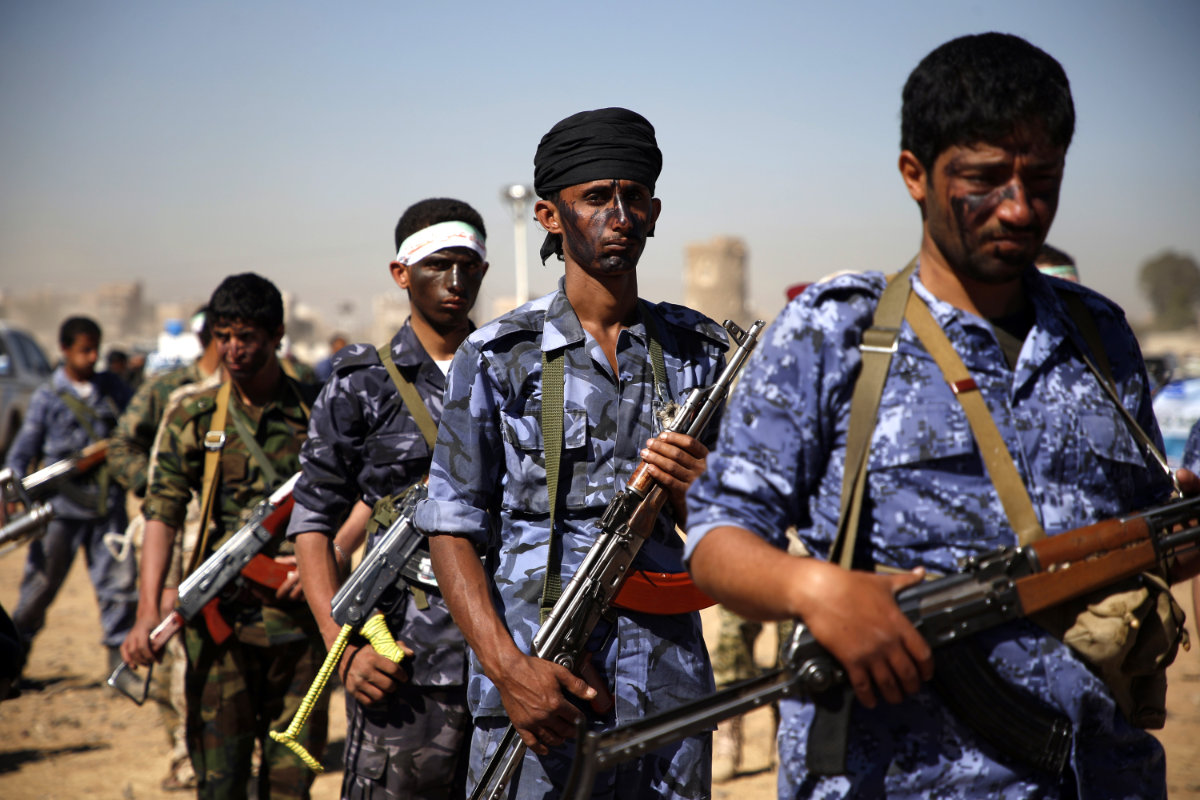
In this photo taken on January 3, 2017, newly recruited Houthi fighters train to fight pro-government forces in several Yemeni cities. (AFP file)
The China-brokered agreement to re-establish diplomatic relations between Saudi Arabia and Iran was a major breakthrough that lowered the chances of further conflict and raised the possibility of a lasting ceasefire in Yemen.
However, analysts believe that much depends on the Houthis’ openness to negotiation and the sides’ willingness to find a compromise solution.
“We still have a window of opportunity, and it has been pushed a little bit more open after the Saudi-Iranian agreement,” said Semneby.
“So I’m mildly hopeful that we can see a more permanent and a more formal monitored ceasefire being negotiated.
“I do think there’s hope. We’re in a better place than we were a year and a half ago, before the Saudi-Iranian agreement.”
One solution being mooted is the partitioning of Yemen into separate northern and southern states, as they had been from 1918 until 1990, when they unified as a single republic.
Some of Yemen’s neighbors are eager that it remain a single entity, while others appear to be gravitating toward partition.
Asked how likely a split might be, Semneby said it could be “messy” but it would be a matter for the Yemeni people to decide.
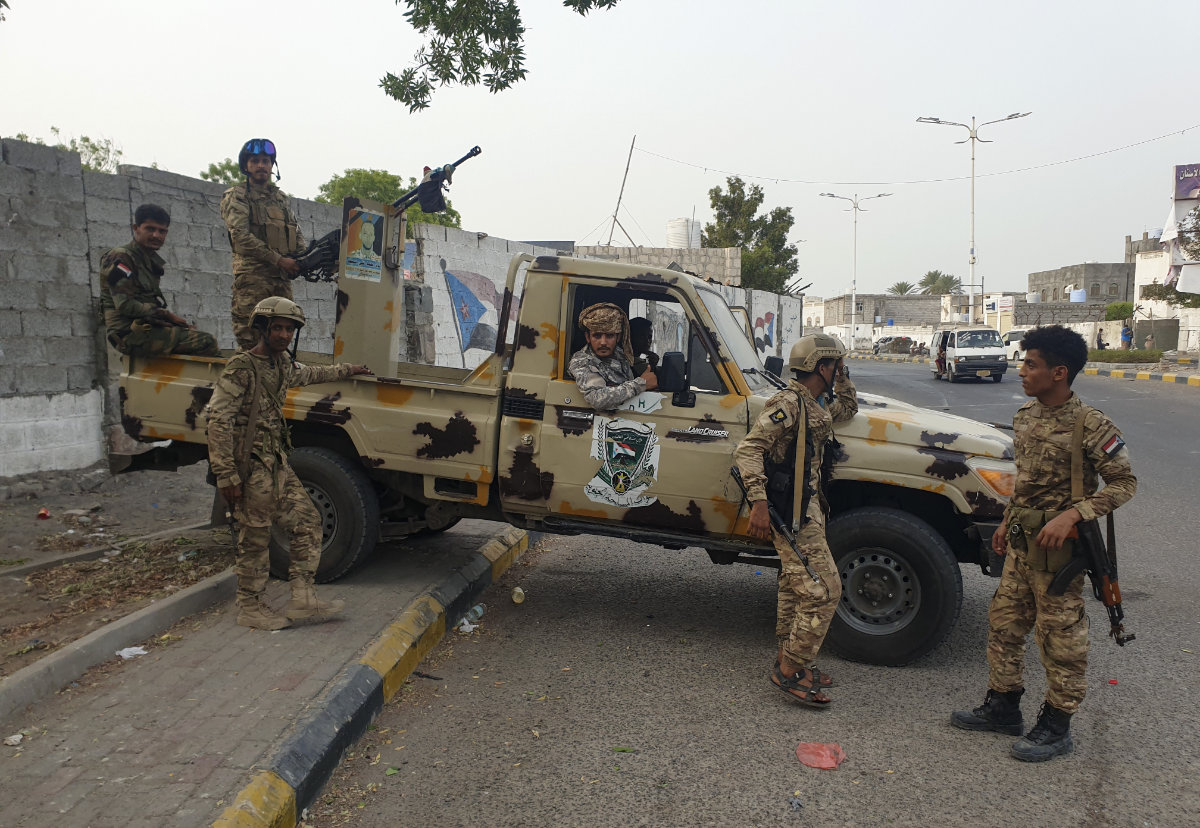
Fighters affiliated with Yemen's separatist Southern Transitional Council deploy in Yemen's southern city of Aden on June 29, 2022. (AFP file photo)
“I don’t want to make any predictions. What I’d like to say is that this is a question that will have to be decided by Yemenis themselves, and this can only be done as part of a comprehensive political process.
“It may very well be that that process will result in a partition, and then the world should respect it. I’d also add that I believe that most countries would prefer a unified Yemen.
“I think the partitions of countries are, although they’ve happened, are always difficult and messy matters. But ultimately this has to be for the Yemenis.
“But … it’s a secondary issue. The primary issue that all Yemenis need to focus on at this moment is to bring an end to the war and to sit together at one table, or in one room, to discuss all the very important and very difficult issues that Yemen is faced with.”
There is even a danger that splitting Yemen in two could lead to further, regional fractures, with provinces such as Hadramout peeling off to form their own state.
“If you start separating one part of the country, there are always those who aren’t going to be happy with the people in charge of that part separating, so … there’s always the risk of a chain reaction,” said Semneby.
“Today we need to focus on the more urgent problems. And I think that those making decisions in Riyadh and Abu Dhabi, they agree on this.
“Their prime concern is that Yemen will be stable, that it won’t be a source of insecurity anymore, that it will be sufficiently prosperous economically to support itself to a much larger extent than is the case now, that it will be able to export its natural resources and so on.
“So these are all the things to concentrate on. And I’m sure that Riyadh and Abu Dhabi agree on this most important and most urgent task in Yemen.”
